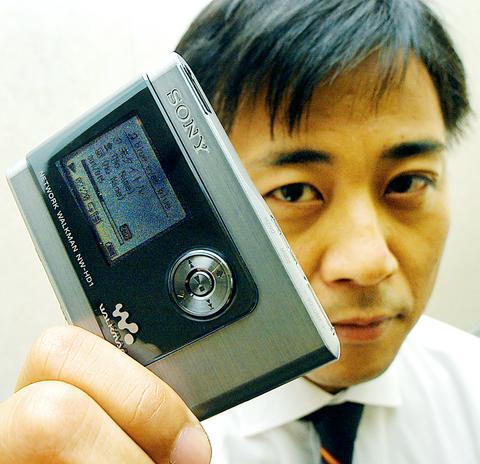When Sony Corp President Kunitake Ando showed off the new Walkman meant to counter the assault by Apple's iPod portable music player, he held the prized gadget at the gala event upside down.
That may have been a bad omen.

PHOTO: AP
The iPod is proving a colossal hit on the Japanese electronics and entertainment giant's own turf. The tiny white machine is turning into a fashion and cultural icon in Japan, much the same way it won a fanatic following in the US.
Apple Computer Inc has launched a marketing campaign in Japan with catchy TV spots and ads covering Tokyo trains. It opened its first Apple store in Tokyo's glitzy Ginza late last year and is opening another in Osaka this month.
"I only want something I can believe in," said design-school student Hiroyuki Sakurai, 21, who was all smiles after buying an iPod recently at the bustling Apple store. "It's a question of sensibility."
When the colorful iPod mini went on sale in July, more than 1,000 people waited for the store to open. The waiting list for minis is now several weeks long.
Although Apple doesn't release regional sales figures, six of the top-selling eight music players in Japan are iPod models, according to Gfk Japan, a market research company.
Its white earbuds are so well-known, just wearing them on Tokyo streets can make passers-by smile approvingly. IPod chat pervades Internet bulletin boards. The mini is such a hit it's being offered as a prize in lotteries sponsored by drink and candy companies here.
Porter bags, a cool brand among Japanese youngsters, sells iPod carrying cases. Rock band Orange Range and hip-hop musician Makoto Sakurai are iPod users.
"First of all, the iPod design is cute," said movie star Shosuke Tanihara, who listens to Prince and Janet Jackson with his iPod while cooking pasta at home or driving his Mercedes. "Japanese electronics products may come packed with a lot of functions, but they usually have more buttons and their designs are cluttered."
The largest, 40GB version, sells for ?4,940 (US$406).
Last month, Sony unveiled the hard-drive Network Walkman -- a product that goes head-to-head against the iPod and promises longer battery life.
It was at that event Ando showed it the wrong side up, an error that has Apple officials smirking. Sony will not release sales figures for the Network Walkman, but says they're meeting targets.
Sony marketing manager Atsushi Kubota said his company wants to promote a wide range of music players in the Walkman lineup, including various types of disks and memory cards, not just the hard drive. Global Walkman sales still total US$20 million a year, according to Sony, compared with more than 3.7 million iPods shipped worldwide so far.
"We want to push the advantages of each type of medium," Kubota said.
"To come up with an innovative gadget that links well with software -- that's something Sony should have done," Yamamoto said.

SECURITY: As China is ‘reshaping’ Hong Kong’s population, Taiwan must raise the eligibility threshold for applications from Hong Kongers, Chiu Chui-cheng said When Hong Kong and Macau citizens apply for residency in Taiwan, it would be under a new category that includes a “national security observation period,” Mainland Affairs Council (MAC) Minister Chiu Chui-cheng (邱垂正) said yesterday. President William Lai (賴清德) on March 13 announced 17 strategies to counter China’s aggression toward Taiwan, including incorporating national security considerations into the review process for residency applications from Hong Kong and Macau citizens. The situation in Hong Kong is constantly changing, Chiu said to media yesterday on the sidelines of the Taipei Technology Run hosted by the Taipei Neihu Technology Park Development Association. With

CARROT AND STICK: While unrelenting in its military threats, China attracted nearly 40,000 Taiwanese to over 400 business events last year Nearly 40,000 Taiwanese last year joined industry events in China, such as conferences and trade fairs, supported by the Chinese government, a study showed yesterday, as Beijing ramps up a charm offensive toward Taipei alongside military pressure. China has long taken a carrot-and-stick approach to Taiwan, threatening it with the prospect of military action while reaching out to those it believes are amenable to Beijing’s point of view. Taiwanese security officials are wary of what they see as Beijing’s influence campaigns to sway public opinion after Taipei and Beijing gradually resumed travel links halted by the COVID-19 pandemic, but the scale of

A US Marine Corps regiment equipped with Naval Strike Missiles (NSM) is set to participate in the upcoming Balikatan 25 exercise in the Luzon Strait, marking the system’s first-ever deployment in the Philippines. US and Philippine officials have separately confirmed that the Navy Marine Expeditionary Ship Interdiction System (NMESIS) — the mobile launch platform for the Naval Strike Missile — would take part in the joint exercise. The missiles are being deployed to “a strategic first island chain chokepoint” in the waters between Taiwan proper and the Philippines, US-based Naval News reported. “The Luzon Strait and Bashi Channel represent a critical access

Pope Francis is be laid to rest on Saturday after lying in state for three days in St Peter’s Basilica, where the faithful are expected to flock to pay their respects to history’s first Latin American pontiff. The cardinals met yesterday in the Vatican’s synod hall to chart the next steps before a conclave begins to choose Francis’ successor, as condolences poured in from around the world. According to current norms, the conclave must begin between May 5 and 10. The cardinals set the funeral for Saturday at 10am in St Peter’s Square, to be celebrated by the dean of the College